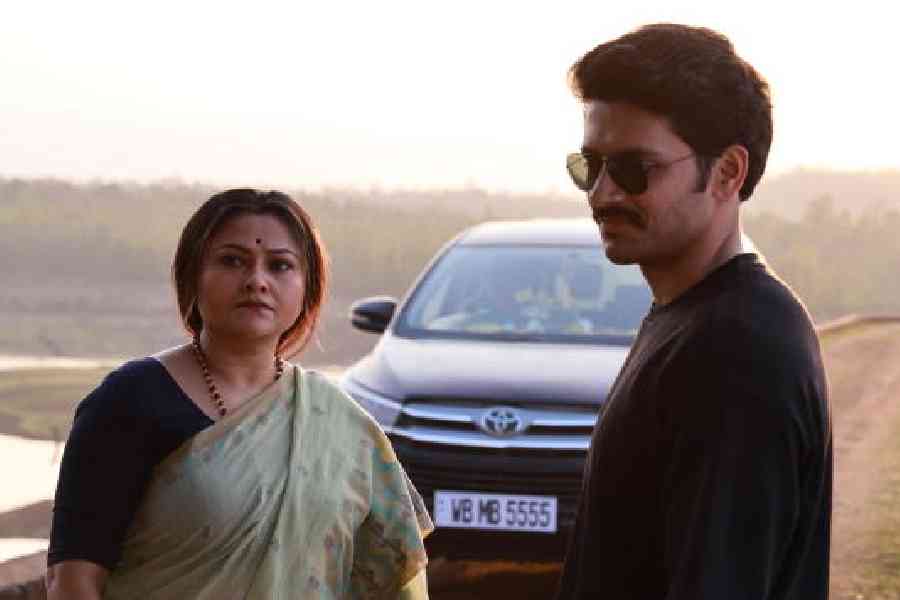Power tends to corrupt and absolute power corrupts absolutely. Great men are almost always bad men, even when they exercise influence and not authority; still more when you superadd the tendency of the certainty of corruption by authority.” — Lord John Emerich Edward Dalberg-Acton
The adage has been true since the beginning of recorded history, is still relevant and will continue to be so in whatever borrowed time our species has left on this rock. Abar Rajneeti (on Hoichoi), just like its predecessor, is a deep dive into the murky political waters of Rijpur and how this adage holds true in every country, city, town or hamlet. By extension, it explores not just how power corrupts, but also how the thirst for it can turn human beings into cold-blooded creatures.
The first season, where we were introduced to the key players in this game of chess, was more an exploration of the internal politics of a powerful family where the external politics essentially formed the backdrop. Several skeletons came out of the closets of the members of the family, dirty secrets were uncovered and the real face of a key player was revealed in a surprising twist, where we went from sympathising with this person to being betrayed by their actual ambitions.
This season, most of this still holds true, except this time the external political scenario is much more at the forefront of things, it’s a tangible force, driving the intentions and decisions of the characters. Unsurprisingly, the stakes are now higher, the waters of Rijpur get murkier, and the game of chess starts falling out of the customary black-and-white settings and more into the grey.
Before anything else, one has to address how difficult it is to make an unapologetically political film or show in these times. Even the slightest nod to real-life events or persons can create controversies and furore. Egos are more fragile than ever and people are almost waiting to be offended. Gone are the days when a Bengali TV soap ruled the ratings primarily because of its similarities to real-life events. Tragically, that sort of artistic freedom simply does not exist in our neck of the woods — anymore.
That is where Rajneeti and Abar Rajneeti are really smart about it. It’s almost as if the writers and makers were aware of the predatory jaws waiting to snap beneath the murky waters they were exploring. Hence, they tread carefully. Does that mean that the show lacks courage? Not at all. Instead, the makers created a smart narrative device to keep any such jaws shut. The audience is brought into the world of Rijpur through Rashi essayed by Ditipriya Roy in perhaps her most mature and layered portrayal to date, a victim of amnesia who remembers very little of her own past and absolutely nothing of the politicking inside her home. Truths are revealed and masks undone, bit by bit, layer by layer, to her and the audience simultaneously till the point that they are wholly inducted and invested.

Ditipriya
That was the first season... in Abar Rajneeti, Rashi goes from being a mute spectator and a victim of her circumstances to being one of the primary catalysts of the same. There is a journey that Rashi leads the audience on, from naivety to pragmatism.
Perhaps the biggest curiosity for audiences would be the return of a character that had almost literally dropped dead in the previous season, no prizes for guessing that there are several twists attached to that reveal. One may feel a little alienated once the truth starts coming out and the twist does feel a bit too convenient initially, but the performance and the writing eventually manage to convince the audience and then some.
In fact, the performances of the primary cast are probably the show’s biggest strength. Kaushik Ganguly leads from the front in this regard, bringing his usual commanding presence and seemingly effortless performance to the show and capturing our attention yet again. The man is an institution. Ditipriya as Rashi, as mentioned before, is delightful. The way she handles the emotional quotient of her character, portrays her inner turmoil and allows her character to evolve progressively is delightful. She does absolute justice to the trust the makers showed in her.
Koneenica Banerjee proves her prowess yet again. Unfortunately, discussing her portrayal would not really be possible without making room for spoilers, but she has one of the most unpredictable characters to portray even though her motives become very clear and straightforward after a certain point.
Arjun Chakrabarty is tasked with essaying a character that goes in a diametrically opposite direction to what was suggested when the character was first introduced and he excels at it. His range as an actor is astounding, playing loverboys, goofy sidekicks, immoral devils and this latest turn with the same panache. The rest of the cast too are effective and believable. If one must nitpick then maybe one could mention the rare scenes that are paced inconsistently.
Abar Rajneeti is an engaging watch, primarily because director Sourav Chakraborty, who is also one of the writers on the project, shows tremendous restraint and sensitivity in the way he narrates his story.
Religion plays a big part in the politics of the show, both internal and external, so do issues like infidelity, adultery, class and identity politics. While certain events on the show might remind audiences of real events in our own history, neither the director nor the writers indulge in using parallels without subtlety.
What is perhaps most remarkable, is how the world of Rajneeti and Abar Rajneeti and its characters get darker with every passing episode. The bloodshed that is associated with rural politics and is almost a sad matter of fact becomes more prominent, but the gears of this change grind so slowly and quietly that the audience, while still shook up every now and then, is never really hit bluntly by the violence being portrayed. What enhances the storytelling is that in an almost Game Of Thrones manner, no character feels indispensable, in turn it makes their risks feel very real, almost palpable. Neither are any of the characters safe from being corrupted by power, not even the ones the audience relates to, which helps the show hold up a mirror at times.
In conclusion, the show does not try to engage with cheap thrills. Instead, it takes its time to get the viewers invested in the plot and characters, before one knows it, they are hooked. As it always is with murky waters, you never know how deep it is till you dive in.











